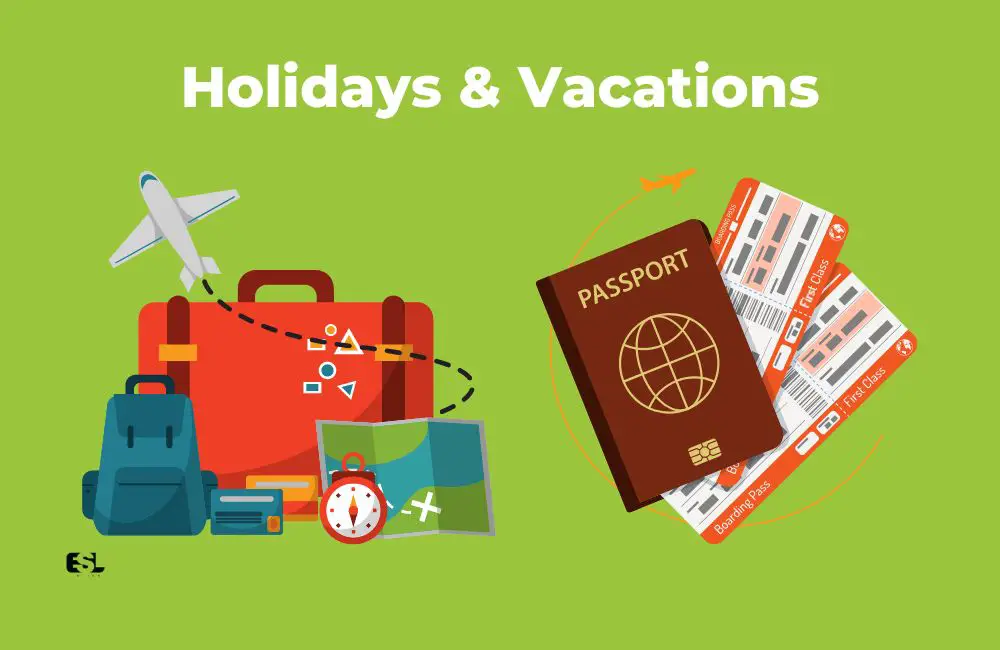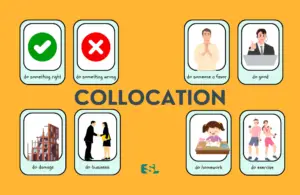Traveling can be one of our most enriching and exciting experiences, allowing us to discover new cultures, savor unfamiliar cuisines, and form friendships that transcend geographical boundaries. However, language barriers can sometimes hinder our ability to immerse ourselves in these experiences fully. This is why having a robust vocabulary specifically catered towards holidays and vacations is so important.
In this post, we’ll explore several holiday and vacation vocabulary categories, broken down by different aspects of the travel experience.
Table of Contents
- 1. Pre-trip Planning
- 2. Travel and Transportation
- 3. Accommodations
- 4. Dining and Food
- 5. Sightseeing
- 6. Emergencies and Health
- Sample Conversation: Using Vocabulary Related to Holidays & Vacations
- Conclusion
- FAQ: Vocabulary Related to Holidays & Vacations
1. Pre-trip Planning
Before embarking on a journey, travelers must plan and prepare. This section is dedicated to the vocabulary related to the preparation stage of a vacation.
| Word/Phrase | Meaning/Usage | Example Sentences |
|---|---|---|
| Itinerary | A planned route or journey | “She organized her itinerary to include a visit to the Louvre.” |
| Reservation | Arrangement for a seat, room, car, etc. to be kept for use | “I have made a reservation at the hotel for three nights.” |
| Travel Insurance | Insurance that is intended to cover medical expenses, trip cancellation, lost luggage, flight accident and other losses incurred while traveling | “Before going on our trip, we purchased travel insurance.” |
| Visa | An endorsement on a passport indicating that the holder is allowed to enter, leave, or stay for a specified period in a country | “I had to apply for a visa to visit China.” |
| Backpacking | Travelling or hiking carrying one’s belongings in a backpack | “We are planning a backpacking trip across Europe this summer.” |
| Excursion | A short journey or trip | “We booked an excursion to the Grand Canyon.” |
| Round trip | A journey to a place and back again | “I bought a round trip ticket to New York.” |
| Destination | The place to which someone is going or something is being sent | “My dream destination is the Maldives.” |
| Accommodation | A place to live, work, stay, etc. in | “We need to find accommodation for our vacation in Rome.” |
| Brochure | A small book or magazine containing pictures and information about something or promoting something | “The travel agent gave us brochures about the tourist attractions in Paris.” |
| Guidebook | A book of information about a place, designed for the use of visitors or tourists | “I bought a guidebook to learn more about the history of Athens.” |
To improve your vocabulary in just 30 days, I recommend to my students an informative, fun, and accessible guide to utilizing powerful language. Millions of individuals have enhanced their academics, job skills, and confidence by dedicating just fifteen minutes daily to the exercises and tests of 30 Days to a More Powerful Vocabulary (Amazon Link), a top-selling. It offers step-by-step methods to bolster language prowess, discover compelling words, and daily vocabulary enhancement with pronunciation guidance.
2. Travel and Transportation
This category encompasses words and phrases related to the different modes of transport that one might use when on holiday or vacation.
| Word/Phrase | Meaning/Usage | Example Sentences |
|---|---|---|
| Departure | The action of leaving, typically to start a journey | “Our departure time is 6 am tomorrow.” |
| Arrival | The action or process of arriving | “Our arrival in London was delayed due to bad weather.” |
| Layover | A period of rest or waiting before a further stage in a journey | “We have a three-hour layover in Dubai.” |
| Jet lag | Fatigue caused by air travel across different time zones | “I always get terrible jet lag when I fly to Australia.” |
| Terminal | A departure and arrival building for air passengers at an airport | “We need to get to the terminal two hours before our flight.” |
| Customs | The place where your luggage is examined when you are going into a country | “We breezed through customs without any issues.” |
| Passport control | The place where your passport is checked when you are going into a country | “Passport control was very busy when we arrived.” |
| Transfer | The process of moving from one place to another | “We took a transfer from the airport to our hotel.” |
| Direct flight | A flight with no layovers | “I was lucky to get a direct flight to Tokyo.” |
| Cruise | A voyage on a ship or boat taken for pleasure or as a vacation | “We’re going on a Caribbean cruise next summer.” |
| Charter | A special hire of an aircraft, boat, or bus for a particular purpose | “We chartered a boat for a day of deep-sea fishing.” |
3. Accommodations
From booking a room to talking about hotel amenities, this section will cover vocabulary related to accommodations.
| Word/Phrase | Meaning/Usage | Example Sentences |
|---|---|---|
| Check-in | The act of reporting one’s presence and registering, typically on arrival at a hotel or airport | “Check-in at the hotel is after 3pm.” |
| Check-out | The act of leaving a hotel after paying and returning your room keys | “Check-out is before noon.” |
| Suite | A set of rooms designated for one person’s or family’s use or for a particular purpose | “We booked a suite with a view of the ocean.” |
| Double room | A room in a hotel with a double bed | “I’d like to reserve a double room for two nights.” |
| Single room | A room in a hotel with a single bed | “The single room is perfect for solo travelers.” |
| Amenities | Useful features of a building or place | “The hotel offers many amenities including a gym, swimming pool, and business center.” |
| Reception | The desk or office where guests in a hotel are received | “You can collect your room key from the reception.” |
| Room service | A service provided by a hotel allowing guests to order food and drink to be brought to their room | “I decided to order room service for breakfast.” |
| Housekeeping | The management of household affairs, specifically cleaning and maintaining a hotel | “Housekeeping comes in daily to clean the rooms.” |
| Reservation | The act of reserving a room in advance | “I made a reservation for a king suite at the resort.” |
| Vacancy | A room or building that is vacant and available for use | “The hotel still has a few vacancies for the weekend.” |
4. Dining and Food
When exploring a new place, the local cuisine can be a highlight of the trip. This section covers vocabulary related to dining and food.
| Word/Phrase | Meaning/Usage | Example Sentences |
|---|---|---|
| Cuisine | A style or method of cooking, especially as characteristic of a particular country, region, or establishment | “The restaurant offers a wide variety of Italian cuisine.” |
| Reservation | Arranging in advance to have a table at a restaurant | “We have a reservation for dinner at 8 pm.” |
| Menu | A list of dishes available in a restaurant | “The menu at this restaurant changes seasonally.” |
| À la carte | Listing or serving food that can be ordered as separate items, rather than part of a set meal | “I prefer ordering à la carte rather than getting a set meal.” |
| Buffet | A meal consisting of several dishes from which guests serve themselves | “The hotel offers a breakfast buffet with a wide selection of foods.” |
| Tipping | To give a sum of money to someone who provides a service, as a way of thanking them | “In the United States, tipping is customary in restaurants.” |
| Specialty | A particular dish or food recommended by a restaurant | “The seafood paella is the specialty of this restaurant.” |
| Wine list | A menu of wines that are available in a restaurant | “The restaurant has an extensive wine list.” |
| Takeout | Food prepared in a restaurant and taken by a customer to be eaten elsewhere | “We decided to get takeout from the Thai restaurant near our hotel.” |
| Vegan/ Vegetarian options | Food options that don’t include meat or animal products | “Many restaurants now offer vegan and vegetarian options.” |
| Allergic | Having an allergy to a particular food or substance | “I am allergic to shellfish, so I need to avoid dishes with prawns.” |
5. Sightseeing
Touring and exploring new locations is a major part of the travel experience. This section provides vocabulary for sightseeing and tour-related activities.
| Word/Phrase | Meaning/Usage | Example Sentences |
|---|---|---|
| Landmark | An object or feature of a landscape or town that is easily seen and recognized from a distance, especially one that enables someone to establish their location | “The Eiffel Tower is a famous landmark in Paris.” |
| Tour guide | A person who shows tourists around places of interest | “Our tour guide in Rome was very knowledgeable.” |
| Historical site | A place where an important event occurred that is preserved because of its cultural heritage | “The Colosseum is a famous historical site in Rome.” |
| Museum | A building where objects of historical, scientific, artistic, or cultural interest are stored and exhibited | “We visited the Louvre Museum in Paris.” |
| Souvenir | An object that is bought to remind oneself of a place one has visited | “I bought a souvenir from each city I visited.” |
| Exhibition | A public display of works of art or items of interest, held in an art gallery or museum or at a trade fair | “We went to an art exhibition in the local museum.” |
| Admission | Permission to enter a place | “The admission fee to the theme park is $50.” |
| Attraction | A thing or place that draws visitors by providing something of interest or pleasure | “The top attraction in Paris is undoubtedly the Eiffel Tower.” |
| Scenic view | A beautiful or picturesque view | “We stopped at the lookout for the scenic view of the coastline.” |
| Excursion | A short journey or trip, especially one engaged in as a leisure activity | “Our school planned an excursion to the local zoo.” |
| Gallery | A room or building for the display or sale of works of art | “We visited the modern art gallery in the city.” |
6. Emergencies and Health
Sometimes, unforeseen circumstances or health issues may arise while on a trip. This section covers vocabulary related to emergencies and health.
| Word/Phrase | Meaning/Usage | Example Sentences |
|---|---|---|
| First Aid | Help given to a sick or injured person until full medical treatment is available | “I always carry a first aid kit when I travel.” |
| Insurance | A contract which provides compensation for specified loss, damage, illness, or death in return for payment of a specified premium | “It’s essential to get travel insurance before going on a trip.” |
| Emergency | A serious, unexpected, and often dangerous situation requiring immediate action | “In case of an emergency, call 911.” |
| Pharmacy | A store where medicinal drugs are dispensed and sold, also called a drugstore | “I need to find a pharmacy to buy some aspirin.” |
| Hospital | An institution providing medical and surgical treatment and nursing care for sick or injured people | “He was taken to the hospital after the accident.” |
| Clinic | A healthcare facility for outpatient care | “I went to the travel clinic to get my vaccinations before the trip.” |
| Medication | A substance used for medical treatment | “Don’t forget to pack your medication.” |
| Sunscreen | A cream or lotion to protect the skin from the damaging effects of the sun | “Always apply sunscreen before going to the beach.” |
| Allergy | A damaging immune response by the body to a substance, especially pollen, fur, a particular food, or dust, to which it has become hypersensitive | “I have an allergy to peanuts.” |
| Prescription | An instruction written by a medical practitioner that authorizes a patient to be provided a medicine or treatment | “I needed a prescription to get certain medications.” |
| Dehydration | The condition of losing more water than is taken in, leading to excessive thirst, dry mouth or skin, little or no urination, severe weakness, dizziness, or lightheadedness | “Make sure to drink plenty of water to avoid dehydration.” |
To improve your vocabulary in just 30 days, I recommend to my students an informative, fun, and accessible guide to utilizing powerful language. Millions of individuals have enhanced their academics, job skills, and confidence by dedicating just fifteen minutes daily to the exercises and tests of 30 Days to a More Powerful Vocabulary (Amazon Link), a top-selling. It offers step-by-step methods to bolster language prowess, discover compelling words, and daily vocabulary enhancement with pronunciation guidance.
Sample Conversation: Using Vocabulary Related to Holidays & Vacations
Situation: At a coffee shop, two friends, Emma and Jake, are discussing their upcoming holiday plans.
Emma: Jake, I’ve been thinking about taking a getaway to the Maldives. I’ve heard it’s the perfect destination for relaxation and water sports.
Jake: Oh, the Maldives! That sounds like a fantastic choice for a tropical retreat. I’ve seen pictures of their overwater bungalows; they look so dreamy!
Emma: Yes, I’m looking forward to unwinding there. Plus, I’ve always wanted to experience a sunset cruise and snorkeling in those crystal-clear waters.
Jake: And don’t forget about the local cuisine. Trying new dishes is always a highlight of any excursion. Have you planned your itinerary yet?
Emma: Not yet. I’m considering an all-inclusive resort so I won’t have to worry about meals or activities. But I’ll definitely set aside a day for sightseeing and exploring the local hotspots.
Jake: An all-inclusive sounds convenient. Just remember to check the peak season dates to avoid large crowds. And maybe look into some eco-tours; they offer a unique perspective on the islands.
Emma: Great advice, Jake! I’ll keep that in mind. This vacation is going to be so rejuvenating!
Conclusion
Armed with the above vocabulary, any travel enthusiast can easily navigate various travel scenarios. Having a good grasp of the terms related to holidays and vacations helps in effective communication and ensures a smoother and more enjoyable travel experience.
So, the next time you plan a vacation, brushing up on your travel vocabulary could be just as important as packing your suitcase. Happy travels!
FAQ: Vocabulary Related to Holidays & Vacations
1. What is a getaway?
A getaway refers to a short holiday or trip, usually taken to escape from routine and relax.
2. How is a destination different from a hotspot?
A destination is a place where someone is going or where something is being sent. In travel, it’s the place one plans to visit. A hotspot, on the other hand, is a popular and trendy place, especially where people go for entertainment.
3. What does tropical retreat imply?
A tropical retreat is a vacation or place of relaxation located in a tropical setting, often characterized by warm weather, beaches, and lush vegetation.
4. Why are overwater bungalows popular?
Overwater bungalows offer direct access to the water below and often provide scenic views, privacy, and a luxurious experience, making them highly sought-after accommodations in tropical destinations.
5. How does an all-inclusive resort operate?
An all-inclusive resort offers guests a package deal that typically includes accommodations, meals, drinks, and sometimes even activities, all for a single price.
6. Why is itinerary planning essential?
An itinerary provides a detailed plan or route of a trip. Planning one ensures that travelers make the most of their time, covering major attractions and activities.
7. What are the benefits of eco-tours?
Eco-tours focus on sustainable travel, ensuring minimal environmental impact. They educate travelers about local ecosystems and cultures, promoting conservation and supporting local communities.
8. What does it mean to unwind on a vacation?
To unwind means to relax and free oneself from stress or worries. On vacation, it’s the act of taking a break from daily routines to rejuvenate.
9. How do peak season dates affect travel plans?
Peak season refers to the busiest times for a travel destination, often due to favorable weather or holidays. While attractions might be livelier, it could also mean higher prices and larger crowds.
10. Why is trying local cuisine recommended when traveling?
Experiencing local cuisine offers a taste of the region’s culture and traditions, making the travel experience more authentic and enriching.






